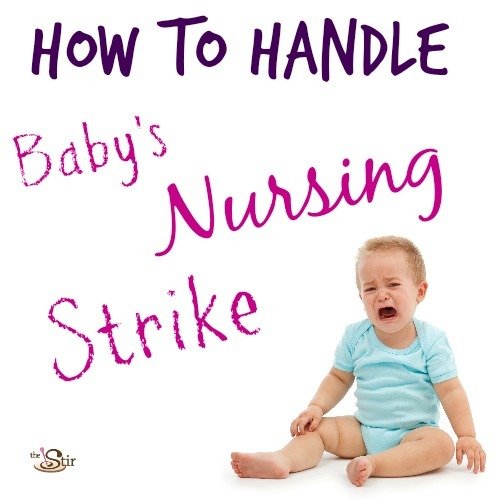It's one of the biggest mysteries of new motherhood: baby has been breastfeeding like a champ, then suddenly, out of the blue, decides to call it quits. These so-called nursing strikes may be baffling but are surprisingly common — and while some moms might assume it's a sign their baby is ready to self-wean, breastfeeding counselor Aliza Bancoff, founder of Main Line Doulas, says that's rarely the case.

"What differentiates a nursing strike from self-weaning is that self-weaning is usually a slow, gradual process, whereas a nursing strike is very abrupt," Bancoff explains. "Self-weaning usually would look like this: baby is nursing six times a day, then the next month just four times a day, and then the next week two times a day, until they drop the last feed. Self-weaning rarely happens before 9 and 12 months."
Nursing strikes, on the other hand, happen most often when babies are 4 to 8 months old.
"A nursing strike would look like this: baby is feeding fine, six times per day," Bancoff explains. "The very next day, baby is brought to the breast and refuses to latch on, and that refusal continues for a day, a few days, or more."
So, why does it happen? Nursing strikes can have any number of causes, but one common culprit is teething.
"Often when a baby is teething, the inflammation can cause discomfort in their gums and/or ears and make nursing unpleasant," explains lactation consultant Leigh Anne O'Connor.
Don't think teething is the culprit?
Your baby may have an ear infection, stuffy nose, sore throat, thrush, or a cut in the mouth that makes nursing uncomfortable. If you're supplementing the breast with bottle feedings, a fast-flowing bottle can make a baby accustomed to getting more milk with less work than nursing, which can lead to a strike.
More from The Stir: 8 Breastfeeding Positions to Make Nursing Easier on Mom
This doesn't have to mean the end of breastfeeding, however. If your baby goes on a nursing strike, pinpoint the problem with the help of your pediatrician or a lactation consultant if necessary, then try adjusting your breastfeeding routine to alleviate the issue.
Sometimes just changing your nursing position can make a difference. Upright positions, for instance, are good if baby is teething since this gives him more control over the amount of pressure he feels on his gums.
It can also help to just "minimize distraction and nurse in a dark, quiet place," says Bancoff. "Get lots of skin to skin contact, and nurse when baby is very sleepy. Or since movement can help, wear baby in a baby carrier or sit in a rocking chair."
If you're worried your baby isn't getting enough sustenance through the strike, check with your pediatrician. If they suggest you find an alternate feeding method, spoon-feeding baby pumped milk or using a supplemental feeding system or syringe are both viable options, says Bancoff.
Last but not least, be patient: You can't force a baby to breastfeed, and getting frustrated or upset could backfire. Try to relax and know that baby will breastfeed once he's ready.
Did your baby go on a nursing strike? How did you cope?
*Image via Celeste Burke/Flickr; Credit: © iStock.com/erierika *




